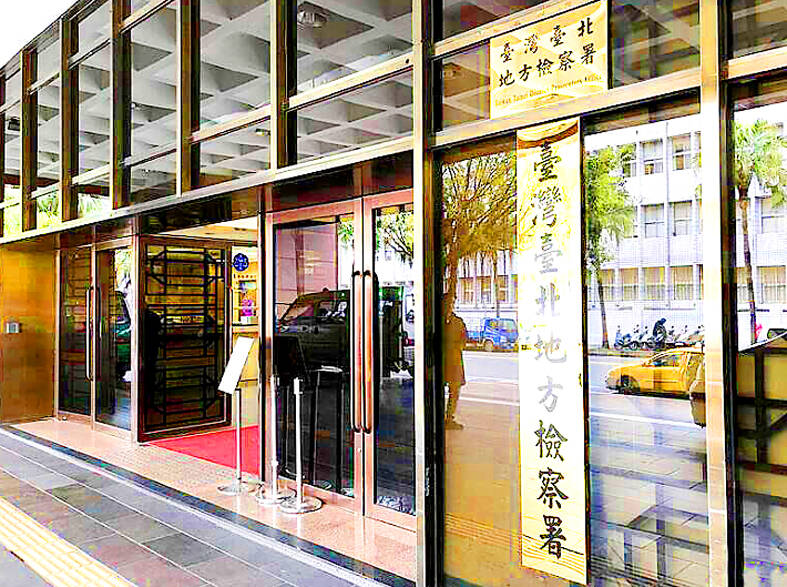Taipei prosecutors on Tuesday last week indicted seven people over thefts of national ID numbers from e-commerce sites to help business tycoon Terry Gou’s (郭台銘) presidential petition drive last year.
The Taipei District Prosecutors’ Office said the defendants were involved in the trade of national ID numbers to fabricate petitions for Gou when he sought an independent presidential bid for the Jan. 13 election.
The indictment issued by the office said that a man surnamed Yu (余) and a woman surnamed Hsu (許) were contacted on the encrypted instant messaging software Telegram by two individuals with the Internet names “CK” and “Bao.”

Photo: Chien Li-chung, Taipei Times
The duo instructed Hsu to procure the details of Taiwan’s national identification card holders for NT$200 each.
The indictment said that Yu provided 16,000 tether coins, a cryptocurrency stablecoin, which amounted to about NT$480,000, to Hsu for the operation.
The case was brought to the attention of authorities after members of the public reported identity thefts, leading to the arrest of Yu and his alleged accomplices, prosecutors said.
Taipei prosecutors indicted seven people — Yu, Hsu, a man surnamed Chen (陳) and four underaged people — for contraventions of Taiwan’s laws, including the Presidential and Vice Presidential Election and Recall Act (總統副總統選舉罷免法) and the Personal Data Protection Act (個人資料保護法).
Prosecutors said the four underaged people involved with the alleged counterfeiting of petitions had been sent to juvenile court.

TRAFFIC SAFETY RULES: A positive result in a drug test would result in a two-year license suspension for the driver and vehicle, and a fine of up to NT$180,000 The Ministry of Transportation and Communications is to authorize police to conduct roadside saliva tests by the end of the year to deter people from driving while under the influence of narcotics, it said yesterday. The ministry last month unveiled a draft of amended regulations governing traffic safety rules and penalties, which included provisions empowering police to conduct mandatory saliva tests on drivers. While currently rules authorize police to use oral fluid testing kits for signs of drug use, they do not establish penalties for noncompliance or operating procedures for officers to follow, the ministry said. The proposed changes to the regulations require

The Executive Yuan yesterday announced that registration for a one-time universal NT$10,000 cash handout to help people in Taiwan survive US tariffs and inflation would start on Nov. 5, with payouts available as early as Nov. 12. Who is eligible for the handout? Registered Taiwanese nationals are eligible, including those born in Taiwan before April 30 next year with a birth certificate. Non-registered nationals with residence permits, foreign permanent residents and foreign spouses of Taiwanese citizens with residence permits also qualify for the handouts. For people who meet the eligibility requirements, but passed away between yesterday and April 30 next year, surviving family members

Taiwanese officials are courting podcasters and influencers aligned with US President Donald Trump as they grow more worried the US leader could undermine Taiwanese interests in talks with China, people familiar with the matter said. Trump has said Taiwan would likely be on the agenda when he is expected to meet Chinese President Xi Jinping (習近平) next week in a bid to resolve persistent trade tensions. China has asked the White House to officially declare it “opposes” Taiwanese independence, Bloomberg reported last month, a concession that would mark a major diplomatic win for Beijing. President William Lai (賴清德) and his top officials

The German city of Hamburg on Oct. 14 named a bridge “Kaohsiung-Brucke” after the Taiwanese city of Kaohsiung. The footbridge, formerly known as F566, is to the east of the Speicherstadt, the world’s largest warehouse district, and connects the Dar-es-Salaam-Platz to the Brooktorpromenade near the Port of Hamburg on the Elbe River. Timo Fischer, a Free Democratic Party member of the Hamburg-Mitte District Assembly, in May last year proposed the name change with support from members of the Social Democratic Party and the Christian Democratic Union. Kaohsiung and Hamburg in 1999 inked a sister city agreement, but despite more than a quarter-century of